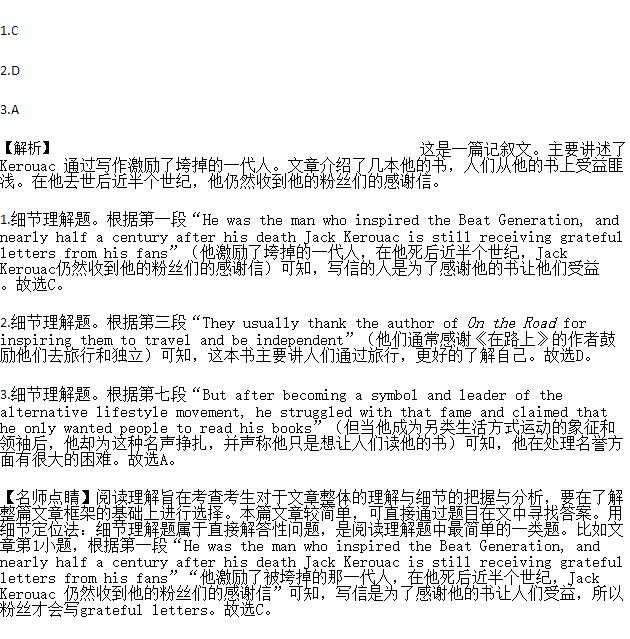题目内容
He was the man who inspired the Beat Generation, and nearly half a century after his death Jack Kerouac is still receiving grateful letters from his fans.
Most letters are sent in the post to his last home in St Petersburg, Florida, and the mail box in the front yard is full to bursting. But others are delivered by hand, pushed under the front door or left on the doorstep.
They usually thank the author of On the Road for inspiring them to travel and be independent. “You remind me to stay true to who you are and to encourage a sense of adventure in all of us.” reads one letter, handwritten by “Cindy” on paper covered with pictures of butterflies and flowers. She adds, “I hope you’re writing, liberated and drinking a glass of wine.”
Another, signed “Friend of Jack”, reads, “I prefer to think of myself as a free spirit and a person who follows a path of her own choosing. You have always been my inspiration.”
His home, where he was living with his mother Gabrielle and his wife Stella, has become a destination for hundreds of fans every year.
Kerouac rocketed to fame at the age of 35, with the publication of On the Road in 1957.
But after becoming a symbol and leader of the alternative lifestyle movement, he struggled with that fame and claimed that he only wanted people to read his books.
Kerouac died just 12 years after On the Road was published. He was suffering from liver problem, following years of heavy drinking largely brought on by his love-hate relationship with fame.
Kerouac, the creator of vivid characters such as Sal Paradise and Dean Moriarty, died at a St Petersburg hospital in 1969, at the age of 47.
1.Why do people still write to Kerouac after his death?
A. His wife and mother still live in his home.
B. They are also suffering from serious illness.
C. People benefiting from his books want to say thanks.
D. People hope to learn how to deal with overnight fame.
2.What is On the Road probably about?
A. How to deal with becoming famous.
B. How vivid characters can be created.
C. Teaching people to appreciate his books.
D. Getting to know oneself better through travel.
3.What can we learn about Kerouac from the text?
A. He had great difficulty dealing with fame.
B. He was depressed because people didn’t read his books.
C. He drank a lot to celebrate his being famous for his works.
D. He was scolded because he promoted an alternative lifestyle.

